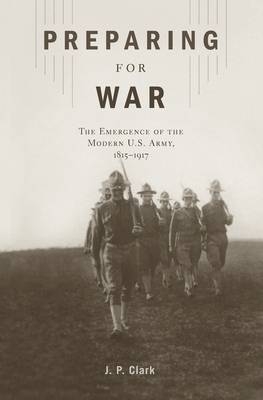
Preparing for War
The Emergence of the Modern U.S. Army, 1815–1917
Seiten
2017
Harvard University Press (Verlag)
978-0-674-54573-1 (ISBN)
Harvard University Press (Verlag)
978-0-674-54573-1 (ISBN)
The U.S. Army has always regarded preparing for war as its peacetime role, but how it fulfilled that duty has changed dramatically between the War of 1812 and World War I. J. P. Clark shows how differing personal experiences of war and peace among successive generations of professional soldiers left their mark upon the Army and its ways.
The U.S. Army has always regarded preparing for war as its peacetime role, but how it fulfilled that duty has changed dramatically over time. J. P. Clark traces the evolution of the Army between the War of 1812 and World War I, showing how differing personal experiences of war and peace among successive generations of professional soldiers left their mark upon the Army and its ways.
Nineteenth-century officers believed that generalship and battlefield command were more a matter of innate ability than anything institutions could teach. They saw no benefit in conceptual preparation beyond mastering technical skills like engineering and gunnery. Thus, preparations for war were largely confined to maintaining equipment and fortifications and instilling discipline in the enlisted ranks through parade ground drill. By World War I, however, Progressive Era concepts of professionalism had infiltrated the Army. Younger officers took for granted that war’s complexity required them to be trained to think and act alike—a notion that would have offended earlier generations. Preparing for War concludes by demonstrating how these new notions set the conditions for many of the successes—and some of the failures—of General Pershing’s American Expeditionary Forces.
The U.S. Army has always regarded preparing for war as its peacetime role, but how it fulfilled that duty has changed dramatically over time. J. P. Clark traces the evolution of the Army between the War of 1812 and World War I, showing how differing personal experiences of war and peace among successive generations of professional soldiers left their mark upon the Army and its ways.
Nineteenth-century officers believed that generalship and battlefield command were more a matter of innate ability than anything institutions could teach. They saw no benefit in conceptual preparation beyond mastering technical skills like engineering and gunnery. Thus, preparations for war were largely confined to maintaining equipment and fortifications and instilling discipline in the enlisted ranks through parade ground drill. By World War I, however, Progressive Era concepts of professionalism had infiltrated the Army. Younger officers took for granted that war’s complexity required them to be trained to think and act alike—a notion that would have offended earlier generations. Preparing for War concludes by demonstrating how these new notions set the conditions for many of the successes—and some of the failures—of General Pershing’s American Expeditionary Forces.
A former member of the history faculty at West Point, J. P. Clark is an active duty army officer who has served as a strategic advisor to senior civilian and military officials in the Pentagon and British Ministry of Defence.
| Erscheinungsdatum | 12.01.2017 |
|---|---|
| Zusatzinfo | 12 halftones |
| Verlagsort | Cambridge, Mass |
| Sprache | englisch |
| Maße | 156 x 235 mm |
| Themenwelt | Geschichte ► Allgemeine Geschichte ► Neuzeit (bis 1918) |
| Geisteswissenschaften ► Geschichte ► Regional- / Ländergeschichte | |
| Geschichte ► Teilgebiete der Geschichte ► Militärgeschichte | |
| ISBN-10 | 0-674-54573-7 / 0674545737 |
| ISBN-13 | 978-0-674-54573-1 / 9780674545731 |
| Zustand | Neuware |
| Haben Sie eine Frage zum Produkt? |
Mehr entdecken
aus dem Bereich
aus dem Bereich
Europa 1848/49 und der Kampf für eine neue Welt
Buch | Hardcover (2023)
DVA (Verlag)
48,00 €
Giordano Bruno - ein ketzerisches Leben
Buch | Hardcover (2024)
C.H.Beck (Verlag)
29,90 €


